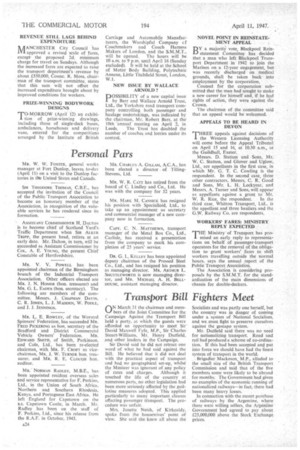Transport Bill
Page 26

If you've noticed an error in this article please click here to report it so we can fix it.
Fighters Meet
(IN March 31 the chairman and mem
bers of the Joint Committee for the Campaign Against the Transport Bill held a party, at which the guests were afforded an Opportunity to meet Sir' David Maxwell Fyfe, M.P., Sir CharlesStuart-Williams. Mr. Henry Duffield, and other leaders in the Campaign.
Sir David said he did not retract one word of what he had said against the Bill. 1-le believed that it did not deal with the practical aspect of transport and had no geographical set-up, whilst the Minister was ignorant of any policy of rates and charges. Although it touched the life of the country at numerous parts, no other legislation had been more seriously affected by the guillotine measures adopted. This applied particularly to many important clauses affecting passenger tiansport. The procedure was unfair.
Mrs. Janette Neish, of Kirkcaldy, spoke from the housewives' point of view. She said she knew all about the Socialists and was partly one herself, but the country was in danger of coming under a system of National Socialism, and we must fight to preserve ourselves against the gestapo system.
Mr. Dutfield said there was no need for nationalizing transport. Road and rail had produced a scheme of co-ordination. If this had been accepted and put into force we should have had the finest system of transport in the world.
Brigadier Mackeson, M.P., alluded to the small size of the British Transport Commission and said that of the five members some were likely to be abroad for months. The Government had given no examples of the economic running of nationalized railways—in fact, there had been many heavy losses, In connection with the recent purchase of railways by the Argentine, wherethere were willing sellers, the Argentine Government had agreed to pay about 125,000,000 above the Stock Exchange prices. •




































































